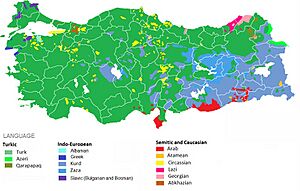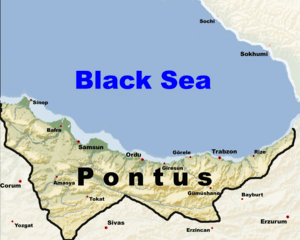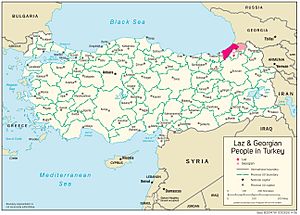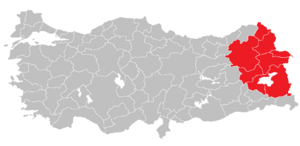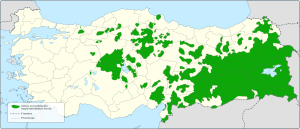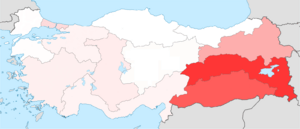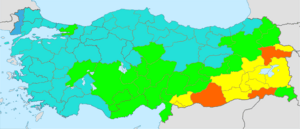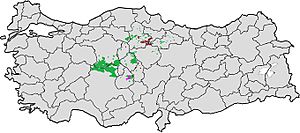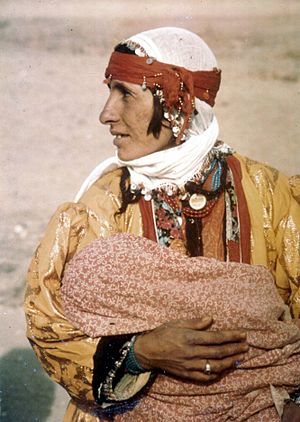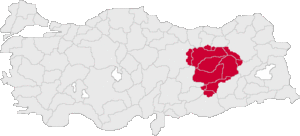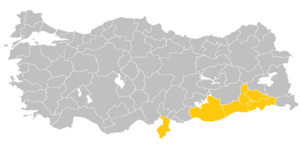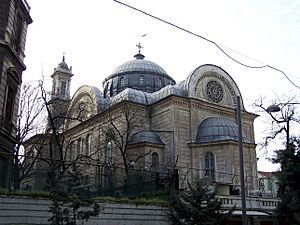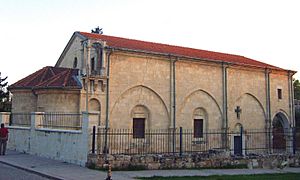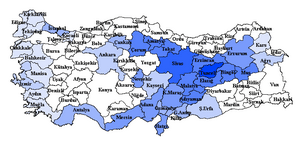Minorities in Turkey facts for kids
| People in Turkey (World Factbook) | ||||
|---|---|---|---|---|
| Groups | Percent | |||
| Turks | 70–75% | |||
| Kurds | 19% | |||
| Others | 7–12% | |||
Turkey is home to many different groups of people. While most people in Turkey are Turks, a large part of the country's population belongs to other ethnic groups. About 30% of the people are from these minority groups.
After a special agreement called the Treaty of Lausanne in 1923, the country officially recognized Armenians, Greeks, and Jews as minority groups. However, other groups, especially Muslim minorities like the Kurds, are not officially recognized in the same way. Kurds are the largest minority group in Turkey.
Many people from minority groups, like Albanians, Bosnians, and Circassians, are descendants of Muslims who moved to Turkey from lands the Ottoman Empire lost. These groups have often blended into Turkish society, speaking Turkish and adopting Turkish customs.
Even though many minorities are not officially recognized, state television and radio channels in Turkey offer programs in different minority languages. Some elementary schools also teach minority languages.
Who Lives in Turkey?
Turkey has a rich mix of people from different backgrounds. Let's explore some of these groups.
People from the Balkans
Many people in Turkey have roots in the Balkans, a region in Southeast Europe.
Albanians
There are many people of Albanian background in Turkey. Some reports suggest there could be up to 5 million people with Albanian roots. Many of them still feel connected to their Albanian heritage, language, and culture.
Bosniaks
You can find signs of Bosniak culture all over Turkey, especially in cities like Istanbul and Izmir. It's hard to know the exact number, but some believe there are about four million Bosniaks in Turkey. Many Bosniaks moved to Turkey a long time ago.
Bulgarians
People who identify as Bulgarian in Turkey include a large number of Pomaks, who are Bulgarian-speaking Muslims. There are also a small number of Orthodox Christian Bulgarians. It's thought that around 300,000 Pomaks in Turkey still speak Bulgarian.
Greeks
Greeks in Turkey are mostly Greek-speaking Christians. They mainly live in Istanbul and on two islands near the Dardanelles. These Greeks are what's left of a much larger Greek population. Many Greeks had to move out of Turkey in 1923 as part of a population exchange with Greece.
Over the years, the number of Greeks in Turkey decreased due to various challenges and people moving away. However, recently, some Greeks have started moving to Turkey for work or school. There are also Muslim Greeks who live in Turkey, especially in cities like Trabzon.
Serbs
In 1965, a census showed that over 6,500 Turkish citizens spoke Serbian as their main language. Many more spoke it as a second language.
People from the Caucasus
The Caucasus region, located between the Black Sea and the Caspian Sea, is another source of Turkey's diverse population.
Abkhaz
Abkhaz people are an ethnic group mainly from Abkhazia, a region by the Black Sea. A large number of Abkhaz people live in Turkey. Their ancestors moved from the Caucasus in the late 1800s.
Armenians
Armenians have lived in the area that is now eastern Turkey for a very long time. In the past, there were many more Armenians in Turkey. However, during the early 1900s, Armenians faced a time of great hardship and loss. Today, there are an estimated 40,000 to 70,000 Armenians in Turkey, mostly living in Istanbul.
Armenians in Turkey have their own newspapers and schools. Most of them belong to the Armenian Apostolic Church.
Chechens and Ingush
Chechens and Ingush people live in several provinces in Turkey, including Istanbul and Sivas. Many of them are descendants of Chechen refugees.
Circassians
There are millions of Circassians in Turkey. They are an immigrant group from the Caucasus. Most of them have blended into Turkish society, and only about 20% still speak their native Circassian language. They are mostly Sunni Muslims.
Georgians
It's estimated that about 1 million people in Turkey have Georgian roots. Most Georgians in Turkey are Sunni Muslims. There are also smaller groups of Georgian Catholics in Istanbul.
Laz
Most Laz people live in Turkey, but they don't have official minority status. Their numbers are estimated to be around 2.25 million. Laz people are Sunni Muslims. Only a small number of them speak the Laz language, which is becoming less common.
People from Central Asia
Turkey has also welcomed people from Central Asian countries.
Kazakhs
About 30,000 Kazakh people live in Turkey, especially in Istanbul. Many Kazakhs moved to Turkey in the 1950s and 1960s. There are organizations in Turkey that help preserve Kazakh culture.
Kyrgyz
Some Kyrgyz refugees from Afghanistan settled in Turkey, particularly in the Lake Van area. They came to Turkey after the Soviet-Afghan War in the 1980s.
Uzbeks
Turkey is home to about 45,000 Uzbeks. Many Uzbeks moved to Turkey in the 1980s, joining existing communities in cities like Kayseri and Izmir.
Uyghurs
There are about 50,000 Uyghurs in Turkey. Many Uyghurs came to Turkey from China in the 1950s. They have become part of the local economy, often working in trade. Uyghur communities can be found in Istanbul, especially in districts like Zeytinburnu.
Turkic Peoples
Many groups in Turkey are related to the Turks through language and culture.
Azerbaijanis
It's believed that up to 800,000 Azeris live in Turkey. About 300,000 of them are citizens of Azerbaijan. They are a large group in the city of Iğdır and the second largest in Kars Province.
Meskhetian Turks
There is a community of Meskhetian Turks, also known as Ahiska Turks, in Turkey.
Iranian Peoples
Some groups in Turkey have roots in Iranian cultures.
Afghans
Afghans are one of the largest groups of migrants in Turkey. Many have fled the conflict in Afghanistan. In recent years, the number of Afghans entering Turkey has increased significantly.
Kurds
Kurds are the largest minority group in Turkey, making up about 18-20% of the population. Unlike Turks, Kurds speak an Iranian language. While Kurds live all over Turkey, most of them live in the eastern and southeastern parts of the country, which is their homeland.
In the past, the Turkish government tried to make Kurds more like Turks. Since 1984, there have been movements by Kurds seeking more rights and sometimes even a separate state.
Ossetians
Ossetians moved to Turkey from North Ossetia in the late 1800s. Today, many of them live in Ankara and Istanbul. There are also Ossetian villages in central and eastern Turkey.
Persians
There are between 500,000 and 650,000 Persians in Turkey.
Zazas
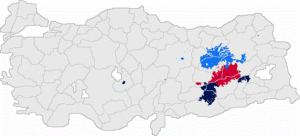
Zazas are a group who often identify as ethnic Kurds. They speak a language called Zazaki, which is related to Kurdish and Persian. Zazaki is spoken in eastern Turkey.
People from Europe
Turkey also has communities of people from various European countries.
Britons
There are at least 34,000 Britons living in Turkey. Many are British citizens married to Turkish people, or British Turks who have moved back. Others are students or people working in white-collar jobs.
Germans
Over 50,000 Germans live in Turkey. Many are married to Turkish people, or are employees, retirees, and tourists who own property there. You might even hear German spoken in Istanbul by Turks who have lived in Germany.
Levantines
About 35,000 Levantines live in Turkey. They are often of Italian or French background and have a long history in cities like Istanbul and Izmir.
Russians
Around 50,000 Russians live in Turkey. Many moved there in the 1990s after the Soviet Union broke apart, seeking better economic opportunities. There are organizations that promote Russian language and culture in Turkey.
Other Minority Groups
Arabs
Arabs in Turkey number between 800,000 and 1 million. They mostly live in provinces near the Syrian border, especially in the Hatay region. Most are Sunni Muslims, but there are also Alawites and Arab Christians.
Turkey has also seen a large number of Iraqis and Syrians enter the country, especially due to conflicts in their home countries. As of April 2018, there were over 3.58 million Syrian refugees in Turkey.
Assyrians
Assyrians were once a large group in the Ottoman Empire. After difficult times in the early 1900s, many were killed or moved away. Today, about 30,000 Assyrians remain in Turkey, mostly in southeastern Turkey and Istanbul.
Jews
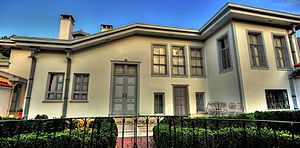
Jewish communities have existed in Turkey for a very long time, since at least 500 BC. Many Spanish and Portuguese Jews came to the Ottoman Empire in the late 1400s after being expelled from Spain. Today, Turkey has a small Jewish population of about 20,000.
Roma
The Roma people in Turkey are estimated to be around 700,000. Sulukule in Istanbul is one of the oldest Roma settlements in Europe. Many Roma in Turkey are Muslims.
Different Religions in Turkey
Turkey is a country where many different religions are practiced.
Atheists
Atheism is the belief that there is no god. In Turkey, the number of people who identify as atheists has grown in recent years.
Bahá'í Faith
The cities of Edirne and Istanbul are important holy places for the Bahá'í Faith. There are an estimated 10,000 Bahá'í followers in Turkey.
Christians
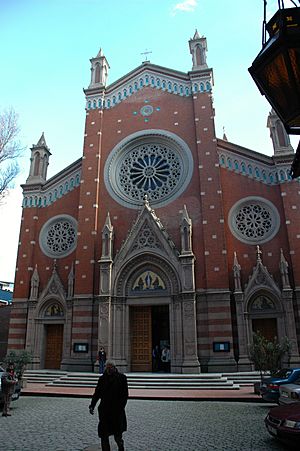
Christianity has a long history in Turkey. Many important Christian figures and early Christian councils took place in this region. Today, there are over 150,000 Christians in Turkey. This includes Armenian Orthodox, Roman Catholics, Syriac Orthodox, Greek Orthodox, and Protestants.
Orthodox Christians
Orthodox Christians are a very small minority in Turkey. The main centers for Christians in Turkey are Istanbul and Hatay province. The main types of Orthodox Christianity are Armenian Apostolic and Syriac/Greek Orthodox.
Protestants
Protestants are also a very small group in Turkey. The Turkish constitution allows for freedom of religion for individuals. There is a community of Turkish Protestants who have converted from Muslim backgrounds.
Roman Catholics
There are about 35,000 Catholics in Turkey. Most of them are in Istanbul. Many Latin Rite Catholics are Levantines, who have Italian or French backgrounds.
Muslims
Most people in Turkey are Muslims. However, there are different groups within Islam.
Alawites
The exact number of Alawites in Turkey is not known, but they are a distinct Muslim group. They traditionally speak a dialect of Arabic similar to Syrian Alawites.
Alevis
Alevis are the largest religious minority group in Turkey, making up about 15-25% of the population. Most Alevis are Turks, but there are also many Kurdish and Zaza Alevis.
Twelvers Shia
There are nearly 3 million Twelver Shia Muslims in Turkey. Most of them are Azeris.
Yazidi
The Yazidi people are from a region that includes parts of Turkey, Syria, and Iraq. In the 1980s and 1990s, most Yazidis left Turkey and moved to other countries, especially Germany, because they faced difficulties as a minority group. Now, only a few hundred Yazidis are believed to be left in Turkey.
|
 | George Robert Carruthers |
 | Patricia Bath |
 | Jan Ernst Matzeliger |
 | Alexander Miles |


